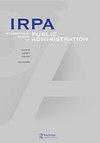公共组织的开放性和社交媒体的使用对电子参与的影响:信任在电子政务中的中介作用
International Review of Public Administration
Pub Date : 2022-10-02
DOI:10.1080/12294659.2022.2136054
引用次数: 2
摘要
摘要尼日利亚在21世纪初实施了电子政务,以改善公共服务提供,促进公民参与,提高透明度和问责制。在实施20年后,本研究考察了公共组织的开放性、社交媒体的使用以及电子政务中信任对电子参与的中介作用。该研究提出了一个概念模型,包括使用PLS-SEM测试的七个假设。数据是通过问卷从来自尼日利亚的689名受访者中收集的。研究结果表明,电子政务的开放性和对电子政务的信任对电子参与有积极影响。社交媒体的使用和电子参与之间的直接关系无法得到证实;然而,电子政务中的信任是间接关系的中介。同样,它考察了社交媒体使用在调查电子参与中的作用。调查结果表明,公共部门组织和电子政务实施者将学习并利用电子政务系统和社交媒体的优势,满足公民的期望。本文章由计算机程序翻译,如有差异,请以英文原文为准。
The influence of openness of public organizations and social media use on e-participation: the mediating effect of trust in e-government
ABSTRACT Nigeria implemented e-government in the early 2000s to improve public service delivery, promote citizens’ participation, enhance transparency and accountability. Twenty years after implementation, this study examines the influence of openness of public organizations, social media use and the mediating effect of trust in e-government on e-participation. The study proposed a conceptual model comprising seven hypotheses tested using PLS-SEM. Data were collected through a questionnaire from 689 respondents from Nigeria. The results show that openness of e-government and trust in e-government positively influence e-participation. The direct relationship between social media use and e-participation cannot be confirmed; however, trust in e-government mediates the indirect relationships. Similarly, it examines the role of social media use in investigating e-participation. The findings implied that public sector organizations and e-government implementers would learn and take advantage of the e-government system and social media strengths to meet the citizens’ expectations.
求助全文
通过发布文献求助,成功后即可免费获取论文全文。
去求助
来源期刊

International Review of Public Administration
Social Sciences-Public Administration
CiteScore
2.00
自引率
0.00%
发文量
21
期刊介绍:
The International Review of Public Administration (ISSN 1229-4659) is published biannually by the Korean Association for Public Administration (KAPA) to provide a worldwide audience with the opportunity for communication and further understanding on issues of public administration and policy. There will be a triple-blind peer review process for all submissions of articles of general interest. There are no particular limitations on subject areas as long as they are related to the field of public administration and policy or deal with public employees. Articles should be analytic and demonstrate the highest standards of excellence in conceptualization, craftsmanship, and methodology.
 求助内容:
求助内容: 应助结果提醒方式:
应助结果提醒方式:


